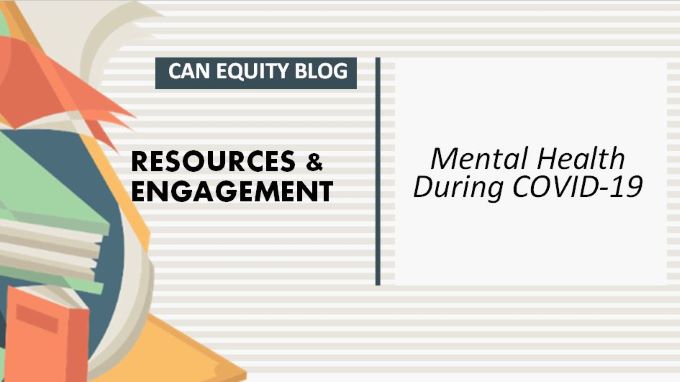
RESOURCES & ENGAGEMENT: Mental Health During COVID-19
Most of us have been practicing social distancing and sheltering in place for over a month now to “flatten the curve” of COVID-19. Although social distancing and sheltering in place are beneficial for stopping the spread of coronavirus, it could have negative effects on people’s mental health. Social distancing requires people to stay at least 6 feet away from people who are not living in their household, which could mean isolation for many people. People are not able to visit people they care about, go out in public, go to work, or go to school… like advised, people are staying home. For people who need caretaking or have pre-existing mental health conditions these orders could cause them to settle for more impersonal care (telehealth, door-stop drop-offs) and less frequent care.
Isolation is not the only effect of social distancing. “Stay Home, Stay Safe” is not true for everyone. Some people are sheltering in place in an abusive environment with abusive parents or abusive partners. Even if these extreme circumstances are not happening, people are dealing with a lot of sudden loss. Loss of loved ones, loss of experiencing special milestones, loss of employment, loss of a sense of normalcy, financial security, food security, and housing stability all due to the coronavirus. Given that we are all experiencing a pandemic that is heightening the severity of all these issues, it is normal for people to be experiencing poor mental health or acting out of their norm (feeling more lethargic/fatigue, lack of focus, trouble sleeping etc.) If we consider Maslow’s Hierarchy of needs, it says that a person’s physiological needs and safety needs have to be met before they can achieve/ focus on meeting any of their other needs (Love, Esteem, Self-Actualization) and for a lot of us our physiological and safety needs are being threatened.
According to a KFF poll, 47% of adults in the US that have been sheltering in place reported that their mental health has been negatively impacted due to the corona virus. Twenty one percent (21%) say the negative impact has been major. In addition, 54% of US adults say that the stress around employment during the coronavirus has caused negative impacts on their mental health, with people making less than $40, 000 feeling the impact more than families making over $90,000. According to the KFF poll, most of the stress and anxiety during this pandemic surround income/ employment and health risk varying between groups of people. People with poor health focusing more on the health impacts and people who recently experienced job loss or were already low income focusing more on the financial impacts that have come with the coronavirus. Adolescents and older adults being more at risk of negative impacts from isolation since they are also the groups at most risk of depression and suicide.
Things we can do day to day to reduce stress and anxiety around COVID-19 could be eating healthy, exercising, getting enough sleep, finding ways to stay grounded, meditating, limiting intake of media about COVID-19, and establishing a routine. Some of the resources below include other suggestions on how to manage stress and anxiety during this time. It is also important to find ways to stay connected during this time. Ways to stay connected could look like calling to check in on a loved one or friend, video calling, participating in group activities that can be done virtually (playdates, happy hours, book clubs, game nights through a shared app etc.). Most importantly remember that this is a pandemic. We are all experiencing great change in our lives that is much different from our norm. It is important that we practice self-compassion as we move through this experience understanding that we are not alone in what we are feeling and as a community we can support each other.
Jelina Tunstill
CAN Program Coordinator
For more updates and resources subscribe to the CAN Monthly Newsletter.
RESOURCES
If you are experiencing a mental health crisis call (512)472-4357. This is Integral Care’s 24/7 Helpline. Services are offered in 15 different languages.
24/7 National Suicide Lifeline – 1 (800) 273-8255
Harris Center for Mental Health and IDD’s 24/7 Mental Health Support Line for stress, anxiety, emotional challenges – (833) 986-1919
If you are experiencing domestic violence call (512)267-7233 or text (737)888-7233. These are 24/7 SAFElines run by SAFE Alliance.
Hogg Foundation for Mental Health Resource Guide – Tools for managing stress, anxiety, and staying connected during COVID-19. Also includes specific resources for older populations, caregivers, providers, and parents.
National Alliance on Mental Illness Resource Guide – Includes information about COVID-19 and resources to deal with stress, loss, and anxiety.
RELATED ARTICLES
- Graphs reveal nearly 40% of baby boomers feel anxious and depressed amid the pandemic while more than half of millennials want to talk to a therapist to help them cope with coronavirus – Daily Mail
- Isolation can be bad for mental health – Axios
- Why You Have Brain Fog During The Coronavirus Pandemic, According To Mental Health Experts – Bustle
- Corona Viewed From Maslow’s Hierarchy of Needs – Psychology Today
- KFF Health Tracking Poll – Early April 2020: The Impact Of Coronavirus On Life In America – KFF